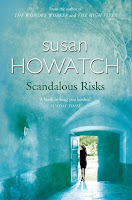 |
| (Amazon UK link) |
However, ‘A slip of the keyboard’ - the non-fiction collection - has sat on my to-read shelf for nearly a couple of years. I finally picked it up to read a few months ago and have dipped into it, off and on, particularly over the past few weeks when I was determined to finish it. The subtitle is, ‘Reflections on life, death and hats’, which was intriguing, but told me very little.
The book is in fact divided into three main sections, the longest of which is entitled, ‘A Scribbling Intruder’. This gives fascinating snippets into Pratchett’s life as a writer, including some ‘scribbling’ from his very early days. It’s not arranged in chronological order, which is a tad confusing; I have no idea how it was all organised. The pieces range from just a couple of pages through to quite long articles, and are collected from a wide variety of places - some are speeches he gave, some are introductions he wrote, some seem to be random jottings.
As a writer myself, albeit on a far lower scale, I found this section mostly quite interesting. I liked learning a bit more about Terry Pratchett too; he clearly felt that he’d led quite a charmed life, falling into literature and writing pretty easily, really. He writes with irony and low-key humour about - for instance - book tours, and the ways authors are treated; about science fiction; about fans, and much more. There was some repetition, which is a bit annoying, but since it’s reporting from different events, that’s not surprising.
The second section is even more random (at least, I couldn’t find any organisation) and is entitled ‘A Twit and a Dreamer’. Essentially this is more speeches and introductions that don’t bear any relation to writing or book tours. I thought some of these were interesting too, light-hearted and easy to read, although, again, there was quite a bit of overlap between some of them.
The final section, ‘Days of Rage’ is much heavier. Here the author writes openly and honestly about his diagnosis of Alzheimer’s Disease, and what it means. He talks about medication - and having to pay for it - and a great deal about his belief in ‘assisted dying’. As it happened he died naturally, rather than having to fly to Switzerland to choose the day, but he did a great deal of research into ways of ending his life, should it have reached the stage where he was no longer able to function as a rational human.
I found the last part rather morbid, and - again - repetitive. I found myself skimming quite a bit as the same ideas were repeated. Again it’s not a surprise - this collection reflects entire pieces Pratchett wrote for different occasions, and it’s inevitable that there will be overlap. As a book to dip into, that’s fine; reading from start to finish, it was, at times, a bit annoying.
Still, I’m glad I’ve read it. It gives quite a bit of insight into Terry Pratchett and his ideas, and it makes a good addition to our large collection of books.
Review copyright 2017 Sue's Book Reviews





